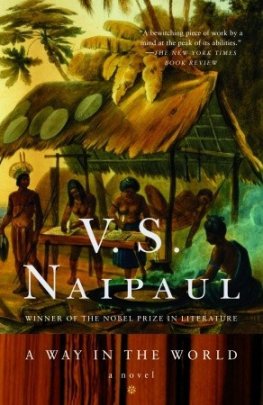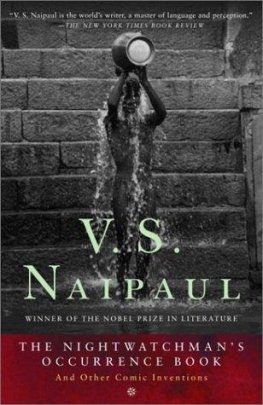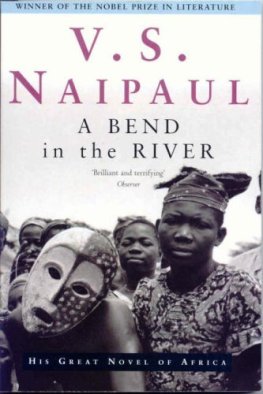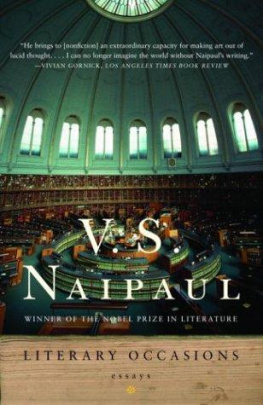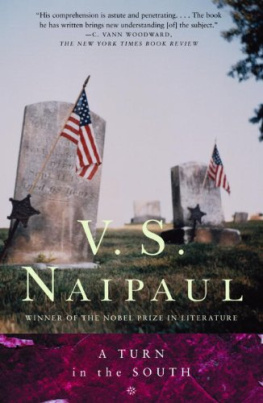Vidiadhar Surajprasad Naipaul - The Middle Passage : The Caribbean Revisited
Here you can read online Vidiadhar Surajprasad Naipaul - The Middle Passage : The Caribbean Revisited full text of the book (entire story) in english for free. Download pdf and epub, get meaning, cover and reviews about this ebook. year: 2002, publisher: Vintage Books, genre: Detective and thriller. Description of the work, (preface) as well as reviews are available. Best literature library LitArk.com created for fans of good reading and offers a wide selection of genres:
Romance novel
Science fiction
Adventure
Detective
Science
History
Home and family
Prose
Art
Politics
Computer
Non-fiction
Religion
Business
Children
Humor
Choose a favorite category and find really read worthwhile books. Enjoy immersion in the world of imagination, feel the emotions of the characters or learn something new for yourself, make an fascinating discovery.

- Book:The Middle Passage : The Caribbean Revisited
- Author:
- Publisher:Vintage Books
- Genre:
- Year:2002
- Rating:4 / 5
- Favourites:Add to favourites
- Your mark:
- 80
- 1
- 2
- 3
- 4
- 5
The Middle Passage : The Caribbean Revisited: summary, description and annotation
We offer to read an annotation, description, summary or preface (depends on what the author of the book "The Middle Passage : The Caribbean Revisited" wrote himself). If you haven't found the necessary information about the book — write in the comments, we will try to find it.
Vidiadhar Surajprasad Naipaul: author's other books
Who wrote The Middle Passage : The Caribbean Revisited? Find out the surname, the name of the author of the book and a list of all author's works by series.
The Middle Passage : The Caribbean Revisited — read online for free the complete book (whole text) full work
Below is the text of the book, divided by pages. System saving the place of the last page read, allows you to conveniently read the book "The Middle Passage : The Caribbean Revisited" online for free, without having to search again every time where you left off. Put a bookmark, and you can go to the page where you finished reading at any time.
Font size:
Interval:
Bookmark:
Also by V. S. Naipaul
NONFICTION
Between Father and Son: Family Letters
Beyond Belief: Islamic Excursions Among the Converted Peoples
India: A Million Mutinies Now
A Turn in the South
Finding the Center
Among the Believers
The Return of Eva Peron (with The Killings in Trinidad)
India: A Wounded Civilization
The Overcrowded Barracoon
The Loss of El Dorado
An Area of Darknes
FICTION
Half a Life
A Way in the World
The Enigma of Arrival
A Bend in the River
Guerrillas
In a Free State
A Flag on the Island
Mr. Stone and the Knights Companion
A House for Mr. Biswas
Miguel Street
The Suffrage of Elvira
The Mystic Masseur
V. S. Naipaul
The Middle Passage
V. S. Naipaul was born in Trinidad in 1932. He went to England on a scholarship in 1950. After four years at Oxford he began to write, and since then he has followed no other profession. He is the author of more than twenty books of fiction and nonfiction and the recipient of numerous honors, including the Nobel Prize in 2001, the Booker Prize in 1971 and a knighthood for services to literature in 1990. He lives in Wiltshire, England.
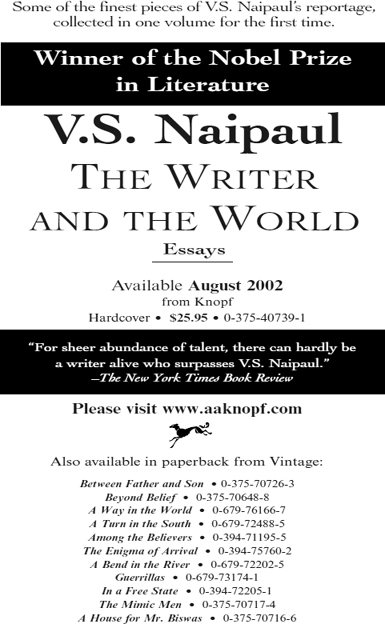
In the carriage with me were several gentlemen; officers going out to join their regiments; planters who had been home on business; young sportsmen with rifles and cartridge cases who were hoping to shoot alligators, &c., all bound like myself for the West Indian mail steamer. The elders talked of sugar and of bounties, and of the financial ruin of the islands.
James Anthony Froude: The English in the West Indies (1887)
T HERE WAS SUCH a crowd of immigrant-type West Indians on the boat-train platform at Waterloo that I was glad I was travelling first class to the West Indies. It wasnt an expensive first class. Ninety-four pounds, which might have bought cabin-class accommodation on one of the ships of the French Line, had got me a cabin to myself on the Spanish immigrant ship Francisco Bobadilla.
Most of the people on the platform and many of those in the train were not travelling down to Southampton. But the compartment I got into remained crowded. One man with a Nat King Cole hairstyle was dandling a fat bonneted baby that was gift-wrapped in ribbons and frills, with a rubber nipple stuck like a gag and a final flourish in its drooping, dripping mouth. Two ladies with felt hats and pink stockings sat slumped against the window. They wore gauze-like dresses over satin petticoats of a fiery pink. The powder on their faces had dissolved in patches, and they crumpled tiny embroidered handkerchiefs in large shining hands. They looked constrained and unhappy. There were baskets with food and baby-supplies on the rack and on the floor.
The man with the baby was talking to the man opposite him of the hardships of life in London.
Is like that Stork on television, he said. Three out of five cant tell the difference from butter. Three out of five dont care for you.
He spoke in a slow, negligent way. The slumped women stared out of the window and said nothing. The baby, fat-cheeked, big-eyed, dribbled. London rolled away on either side of the railway canyon: the grimy backs of houses, the red tops of buses, the bright new advertisements, the signs on small shops, the men in white overalls on ladders: pictures that already felt like memories: the promised land from which we were already separated: the train just another of the morning noises.
Eh! I tell you about the foreman? He spoke easily; the train was not England. One day he say, Blackie, come here a minute. I watch at him, and I say, Good. I coming. I went up and hit him baps! Clean through a glass window. He didnt gesticulate. He was dandling the baby on his knee.
In the babys basket one saw the things of England, a few minutes ago commonplace, now the marks and souvenirs of the traveller: the bottle of Lucozade, the plastic baby bottle (in the West Indies it would have been a small rum bottle), the tin of baby powder.
Baps! Clean through the glass window.
The ticket collector, tall and elderly, slid the compartment door open. On this train he was a foreigner, but his manner was neutral; he might have been on the Brighton train.
Tank God, I didnt have the monkey-wrench in my hand. I wouldnt be sitting down in this train holding this baby on my lap today.
The ticket collector examined and clipped, and slid the door shut.
From the next compartment a very tall and ill-made Negro stepped out into the corridor. The disproportionate length of his thighs was revealed by his thin baggy trousers. His shoulders were broad and so unnaturally square that they seemed hunched and gave him an appearance of fragility. His light grey jacket was as long and loose as a short topcoat; his yellow shirt was dirty and the frayed collar undone; his tie was slack and askew. He went to the window, opened the ventilation gap, pushed his face through, turned slightly to his left, and spat. His face was grotesque. It seemed to have been smashed in from one cheek. One eye had narrowed; the thick lips had bunched into a circular swollen protuberance; the enormous nose was twisted. When, slowly, he opened his mouth to spit, his face became even more distorted. He spat in slow, intermittent dribbles; and when he worked his face back in, his eyes caught mine.
I felt I had attracted his malevolence. And thereafter I couldnt avoid this Negro with the ruined face. I went to the lavatory. Our eyes met, twice. I went looking for a buffet car. I saw him. There was no buffet car. On the way back I saw him. Next to him sat a much smaller Negro, in a grey coat as well, with big blank eyes as lack-lustre as boiled eggs, long arms and long hands, clumsily clenched, resting on his knees. His trousers were too short and rose tightly inches above his socks, so that he looked like a boy who had outgrown his clothes. His mouth was open. In the same compartment there was another Negro with the physique of a wrestler, and two young white men, one fat, one thin, both bald, in new sports jackets and sharply-creased flannels.
In my own compartment the baby was being fed. Its nose ran; its mouth leaked; it slurped and squelched and was frequently winded.
So you want rent? the baby-feeder was saying. I tell you I aint paying any more than what I was paying before. He say, Blackie, I coming up to get my rent or to get you out of that room. I watch at him and I say, Good. Come up, bakra. He come up. I give him one kick bam! He roll down the steps bup-bup-bup.
I pass round there last week. He gave up a big sign in green paint. Please No Coloured. In green paint. I tell you, man, is like Stork.
At Southampton there was a further thinning out of passengers. The man with the Nat King Cole hairstyle was only seeing off his wife and baby; he himself was remaining behind to face aggressive landlords and foremen and Please No Coloured signs.
We were directed to one of the ocean terminals less luxurious waiting rooms, next to the railway sheds, in the gloomy recesses of which we could see the immigrants who had arrived that morning on the Francisco Bobadilla: a thick, multi-coloured mass herded behind wooden rails, and as silent as though they were behind glass. We stood at the doors and watched. No one stepped out of the travellers waiting room into the immigrants shed. There was interest, disapproval, pity and mockery in the gazes, the old hands sizing up the clothes of the new arrivals, clothes like those in which they had themselves landed some time before: thin white flannel trousers, sky-blue tropical suits, jackets with wide shoulders and long skirts, and those broad-brimmed felt hats, unknown in the West Indies yet
Next pageFont size:
Interval:
Bookmark:
Similar books «The Middle Passage : The Caribbean Revisited»
Look at similar books to The Middle Passage : The Caribbean Revisited. We have selected literature similar in name and meaning in the hope of providing readers with more options to find new, interesting, not yet read works.
Discussion, reviews of the book The Middle Passage : The Caribbean Revisited and just readers' own opinions. Leave your comments, write what you think about the work, its meaning or the main characters. Specify what exactly you liked and what you didn't like, and why you think so.

